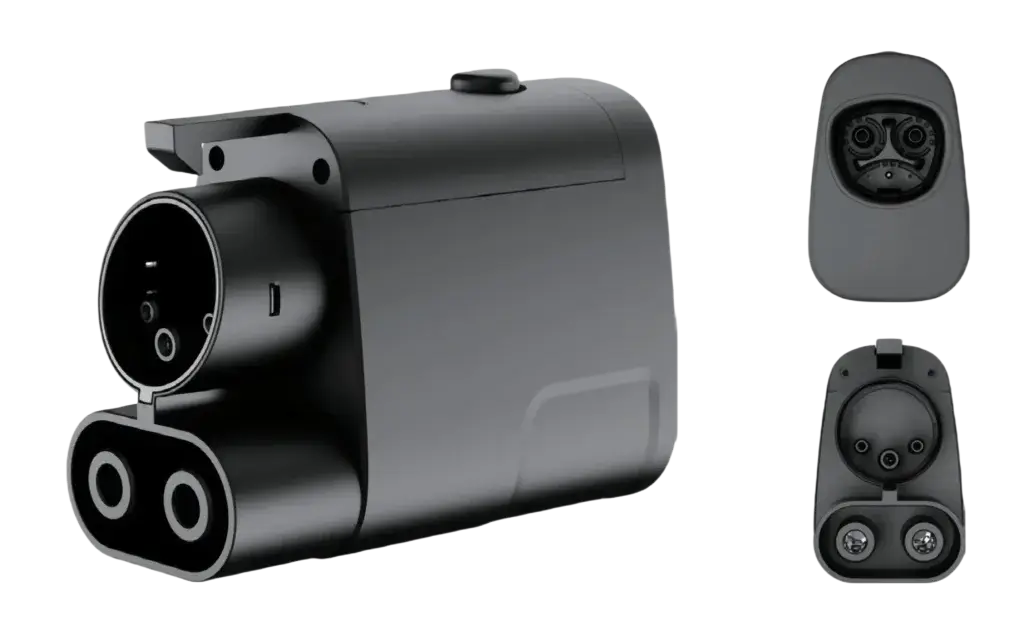In June 2025, Costco quietly made a move that could transform how Americans charge their electric vehicles (EVs). At its North Port, Florida location, the retail giant partnered with Electric Era—a company founded by ex-SpaceX engineers—to install six fast EV charging stalls capable of delivering up to 80% battery charge in as little as 20 minutes. While the rollout was small, the implications are enormous. As EV adoption surges past infrastructure readiness, initiatives like these shine a spotlight on a major but often overlooked challenge: not all EVs are compatible with all chargers—especially when it comes to fast charging.
Imagine pulling into a fast charger only to discover the plug doesn’t fit your vehicle. This kind of mismatch is more common than many new EV owners expect, particularly given the variety of charging standards—CCS, CHAdeMO, and Tesla’s NACS—currently in use. That’s why more and more drivers are turning to a crucial solution that bridges this compatibility gap: the EV charging adapter.
The EV Boom Is Outpacing Charging Infrastructure
Over one million new EVs were registered in the U.S. in 2024 alone, and 2025 is already on track to break that record. But for many EV owners, charging remains a frustrating experience. Level 2 chargers are slow—often requiring six to eight hours to fully charge a battery—and Level 3 fast chargers, while much faster, are still limited in number.
Moreover, even when a charger is available, it may not be compatible with every EV. That’s because different manufacturers use different charging standards across different regions—such as Type 1 (SAE J1772), Type 2 (Mennekes), CCS1 (Combined Charging System), CCS2, CHAdeMO, or Tesla’s proprietary NACS (North American Charging Standard).
This is where EV charger adapters come into play. As more public charging stations emerge—whether in Costco parking lots or elsewhere—drivers need flexible tools to connect their vehicles to a wider variety of charging networks.
What Is an EV Charging Adapter?
An EV charging adapter is a small, portable device that allows an electric vehicle with one type of charging port to connect to a charging station that uses a different plug standard. Think of it as the travel adapter of the EV world. Without it, you might find yourself parked next to a charger you simply can’t use.
As more European EVs hit U.S. roads, a European to Tesla DC (Type 2 – CCS2) EV charger adapter becomes essential for connecting to Tesla’s expanding Supercharger network. Similarly, as Tesla continues opening its Supercharger network to other brands, EV owners will need NACS-to-CCS adapters (or vice versa) to take advantage of this access.
In essence, EV charging adapters unlock convenience, enabling drivers to charge almost anywhere without being limited by their car’s plug type.
Why EV Charging Adapters Matter More Than Ever
Costco’s decision to install fast chargers is a step in the right direction, but it also exposes a critical pain point: even the best charging networks are only as useful as they are compatible.
Today, Tesla’s Supercharger network is arguably the most reliable and widespread in North America. Tesla’s recent partnerships with automakers like General Motors, Hyundai, Kia, and Honda signal a major shift in the EV ecosystem. Most of these companies plan to adopt NACS plugs—or at least offer adapters that make their cars compatible with Tesla’s infrastructure.
But there’s a transition period. Many EVs on the road today use CCS or CHAdeMO ports. Until all EVs adopt a universal standard (which may still take years), adapters remain a necessary bridge between what’s available and what’s needed.
Convenience Meets Necessity in Retail Charging
What makes Costco’s pilot so interesting is how it combines two routines into one: shopping and charging. This is a model that could reduce EV range anxiety and make public charging more user-friendly. But it also raises important logistical questions.
Imagine you arrive at a Costco charging stall only to discover it uses a plug that doesn’t fit your EV. Or maybe the stall was designed for Tesla vehicles, and you drive a Chevy Bolt. Unless you have the right EV charging adapter in your trunk, you’re out of luck.
That’s why forward-thinking EV owners are starting to carry multiple adapters in their cars—just as drivers once carried spare tires or jumper cables. It’s a small investment for a big return in convenience.
What to Look for in a Reliable EV Charging Adapter
If you’re considering adding a charging adapter to your toolkit, here are a few things to keep in mind:
- Compatibility: Ensure the adapter supports your EV’s plug type and the one used by the station (e.g., CCS to NACS, CHAdeMO to CCS).
- Charging Speed: Some adapters support only slower charging levels. Look for those rated for DC fast charging if you plan to use Level 3 stations.
- Certification: Always buy certified products that meet safety standards.
- Portability: Lightweight, weatherproof adapters are ideal for everyday travel.
Conclusion
As more retailers like Costco adopt fast charging infrastructure and public stations become more widespread, EV charging adapters are quickly shifting from a “nice-to-have” to a “must-have.” They empower drivers to use a broader network of chargers, saving time and avoiding stress—especially in remote areas or during peak charging hours.
Much like smartphones evolved from being accessories to essentials, adapters are becoming key enablers in the EV journey. They bring flexibility, reduce bottlenecks, and make the dream of seamless electric driving more attainable.
So whether you’re on a cross-country road trip, headed to your local Costco, or simply trying to make your daily commute more efficient, don’t forget the one item that can truly power your journey—your EV charging adapter.



